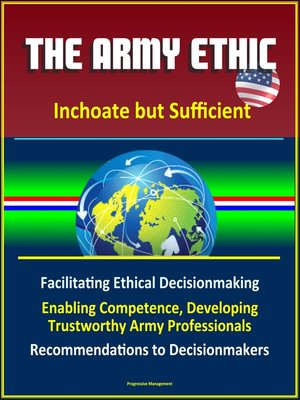The Army Ethic
ebook ∣ Inchoate but Sufficient--Facilitating Ethical Decisionmaking, Enabling Competence, Developing Trustworthy Army Professionals, Recommendations to Decisionmakers
By Progressive Management

Sign up to save your library
With an OverDrive account, you can save your favorite libraries for at-a-glance information about availability. Find out more about OverDrive accounts.
Find this title in Libby, the library reading app by OverDrive.



Search for a digital library with this title
Title found at these libraries:
| Loading... |
This excellent report has been professionally converted for accurate flowing-text e-book format reproduction. The Army's inchoate professional Ethic attempts to fill a significant gap in the Army's attempt to maintain professional status. It demonstrates the intentionality to address ethical failures by promulgating an aspirational Ethic focused on "The Trustworthy Army Profession" who has character, competence, and commitment. Is the Army Ethic sufficient for the Army profession? The Army Ethic passes screening criteria from an external literature review, which makes it a viable option as an Ethic. It also does better than the current, inaccessible Ethic with the evaluation criteria. Based on the research, the Army Ethic is sufficient for the Army profession. However, the Ethic could improve in several ways.
Chapter 2 will examine existing literature on the Army Ethic, which should provide insights into the secondary questions. Chapter 3 will explain the methodology. Chapter 4 will address the secondary questions, evaluate the AE, and answer the primary question. Chapter 5 will provide recommendations for decision-makers and future researchers.
There is no fully articulated, standalone Army Ethic. Because of its dispersion in oaths, creeds, national documents, and in the law, the Army Ethic is inaccessible, misunderstood, and not universally applicable. This means that Soldiers cannot easily use it to guide them in ethical decisionmaking, leaders cannot easily adjudicate ethical violations that are not illegal, and the Army cannot easily cull the profession of ethical violators or develop the profession ethically.
American public opinion considers military officers one of the most trusted and ethical groups in the nation. The Army has maintained this high degree of trust in spite of recent ethical failures while deployed, in garrison, and in light of the evidence of ethical fading. While deployed, the Army has dealt with egregious jus in bello violations at Abu Ghraib, Mahmudiyah, and Panjwai. The Department of Defense Office of General Council regularly updates the Encyclopedia of Ethical Failure, which includes numerous stories about Soldiers failing to do the right thing with government resources. These ethical failures are not limited to regular Soldiers. The American public also has increasing concern about senior officer ethical violations. On one hand, because these deployment and garrison ethical violations illustrate offenses that were also illegal, a professional could easily explain them away as isolated, individual acts by people who knew better and should have done their duty.
On the other hand, some see the problem as an increasing normalization of deviance. A recent study shows that "untruthfulness is surprisingly common in the U.S. military even though members of the profession are loath to admit it". Wong and Gerras attribute it to "ethical fading," the process of watering down the ethical implications of a moral decision to justify wrongdoing. The deceit they describe is not the problem of a few deviants; it is a persistent, ubiquitous problem.






